Charles E W Bean, Diaries, AWM38 3DRL 606/276/1 - 1928-1937 - Part 2
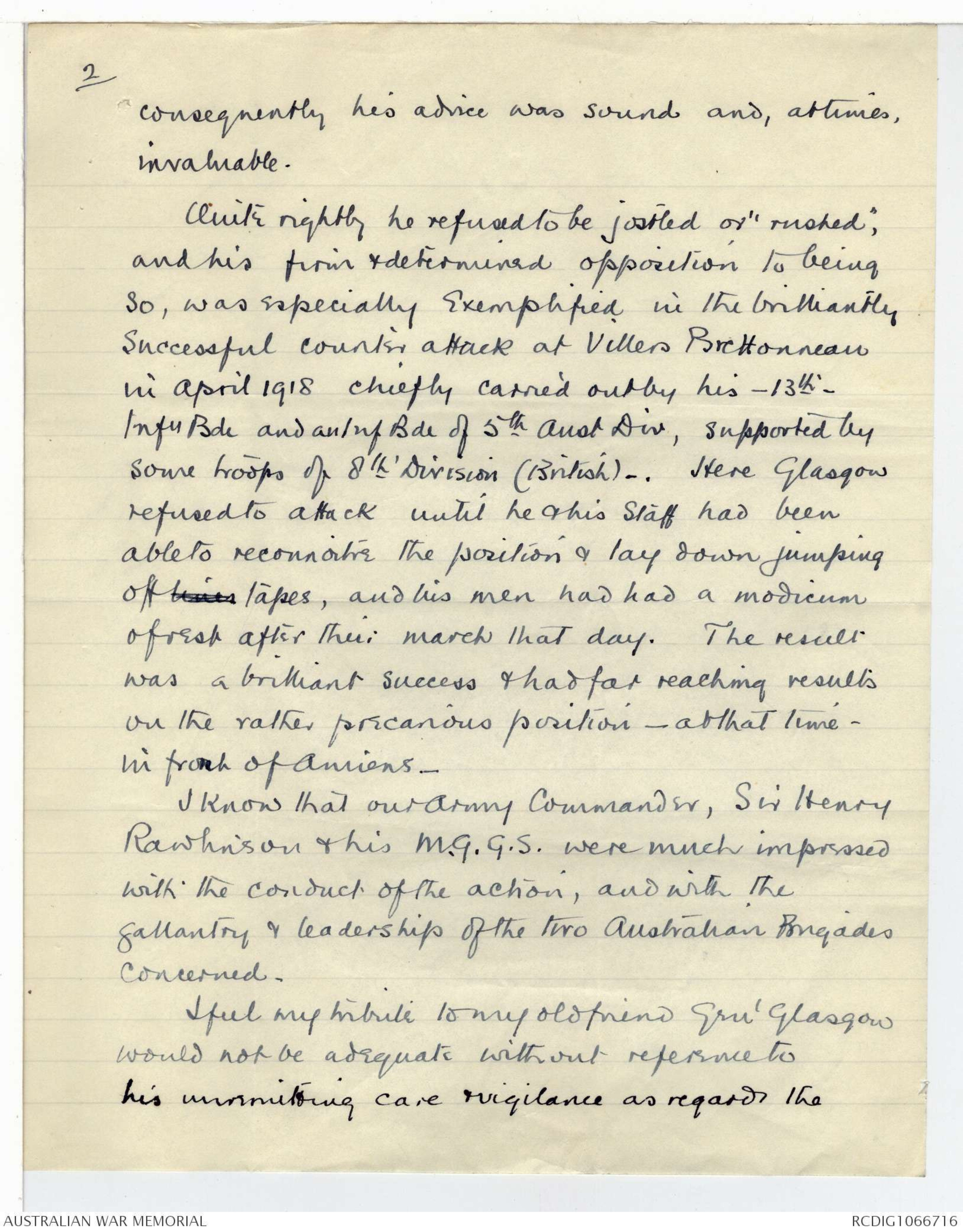
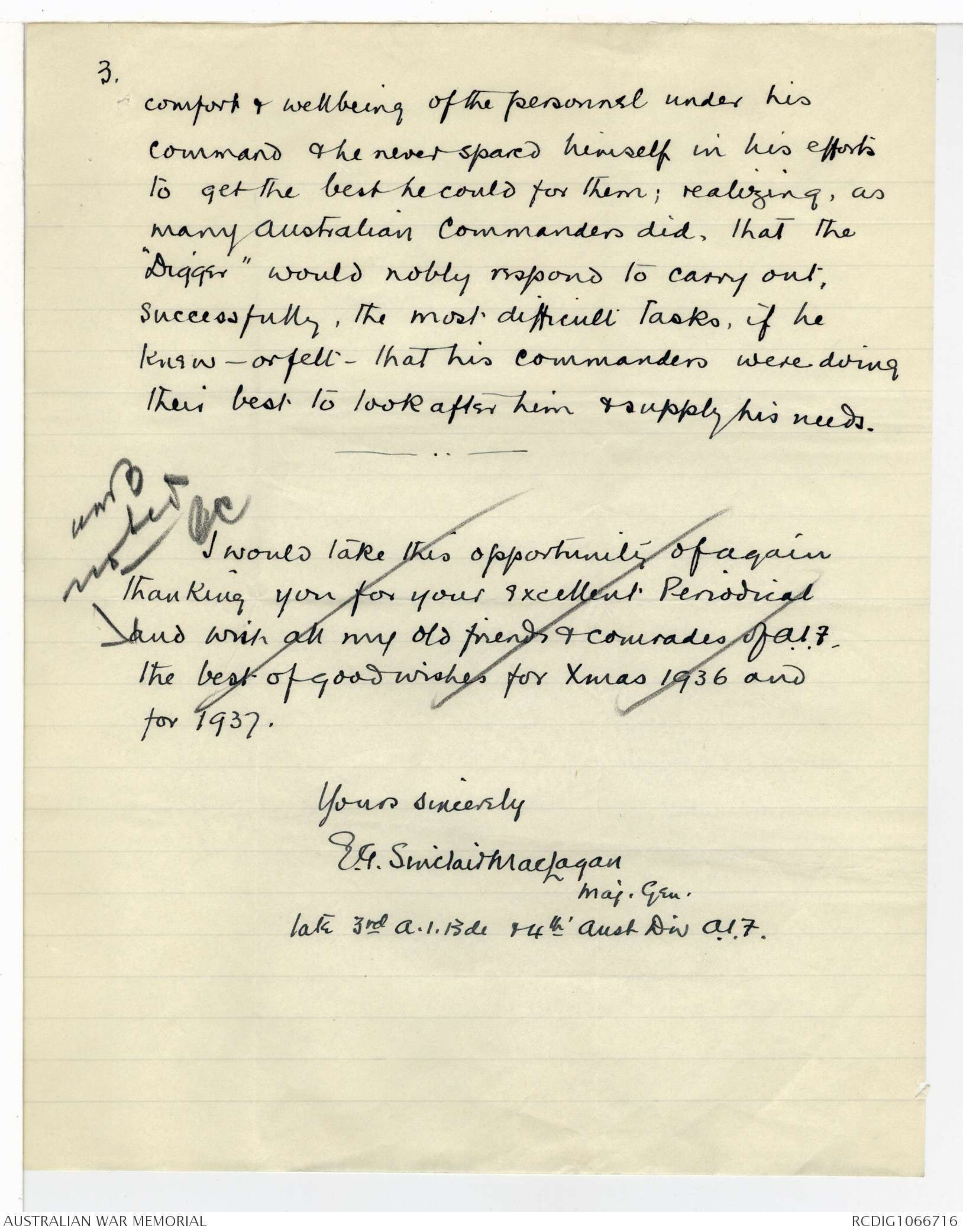
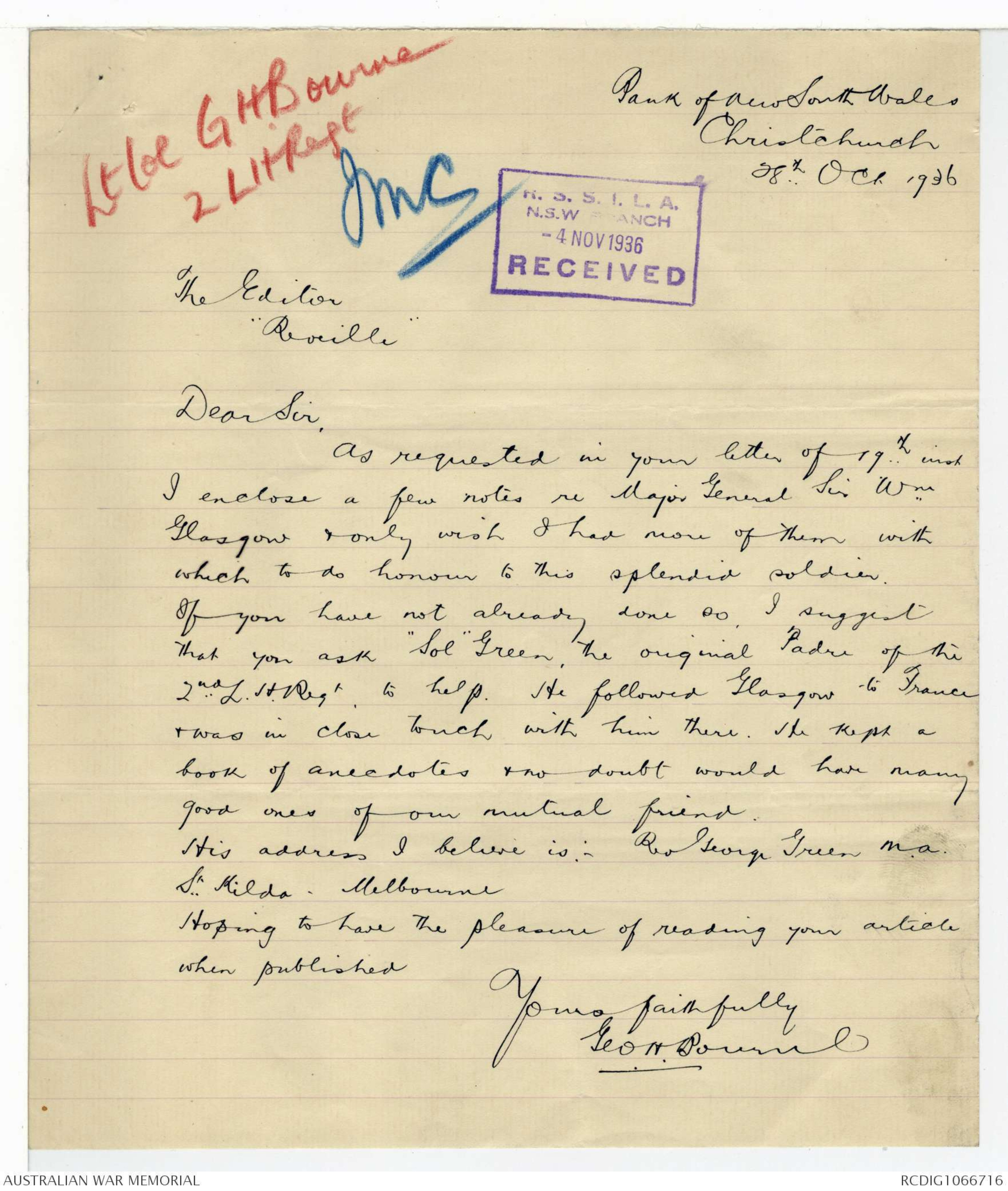
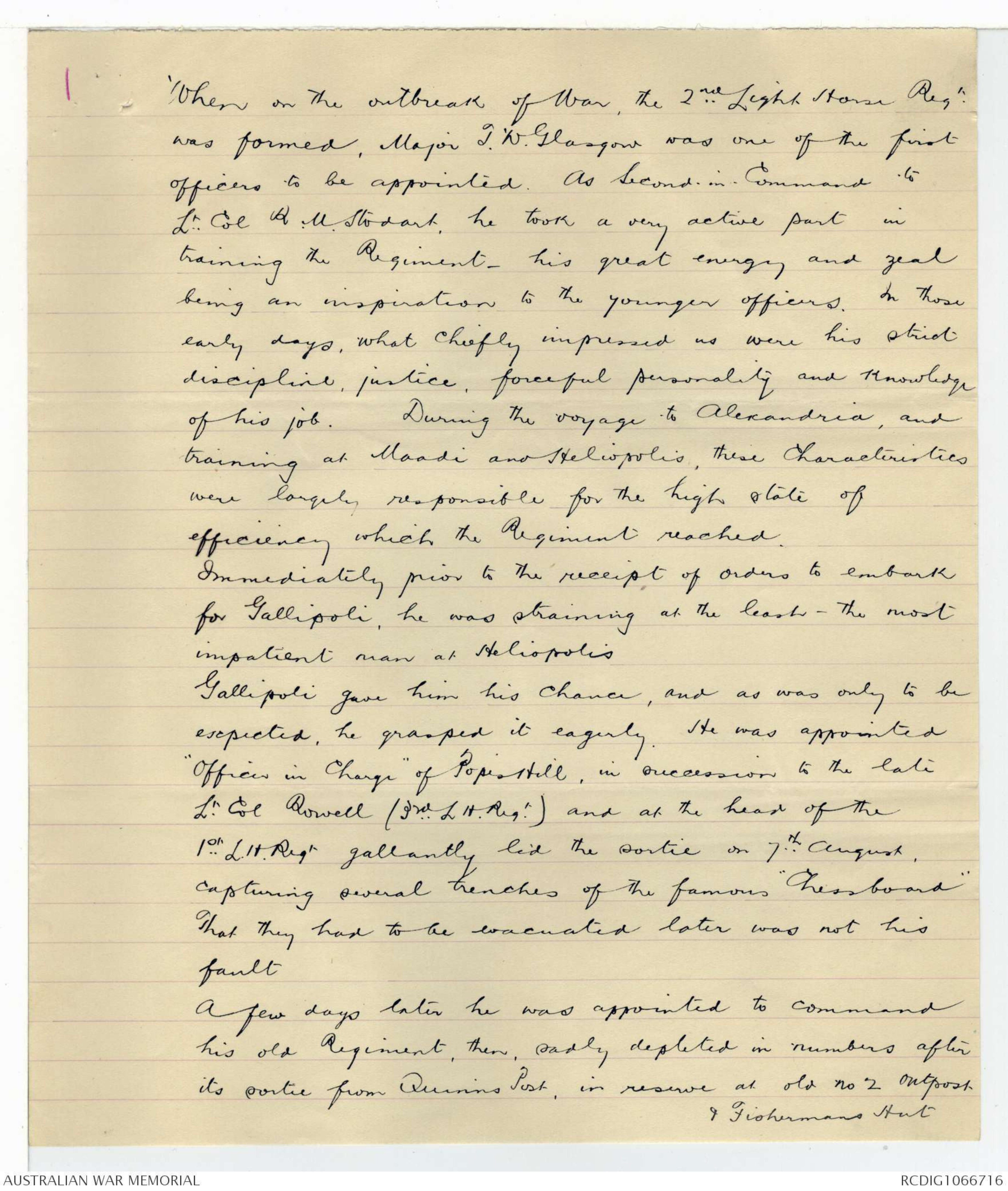
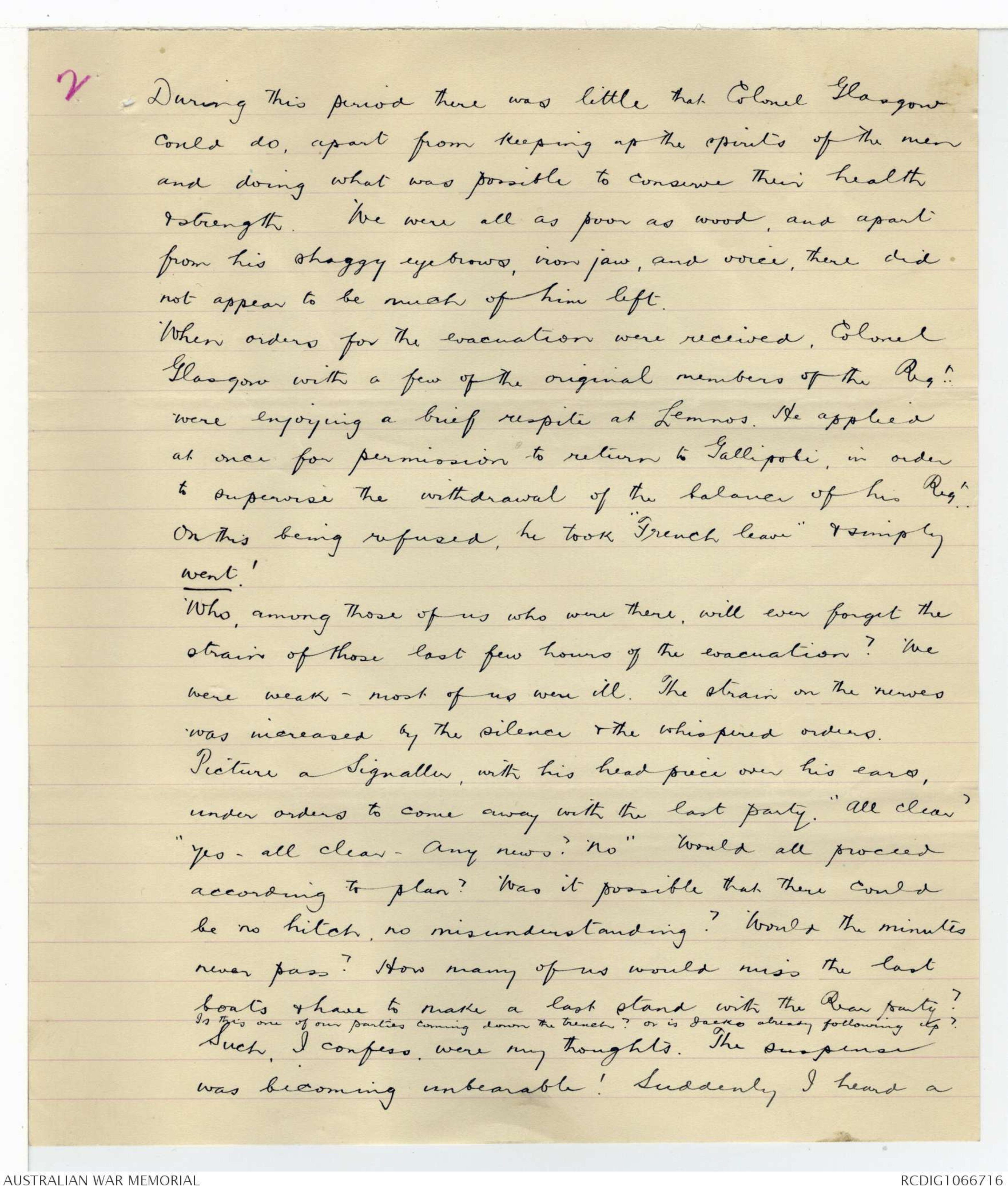
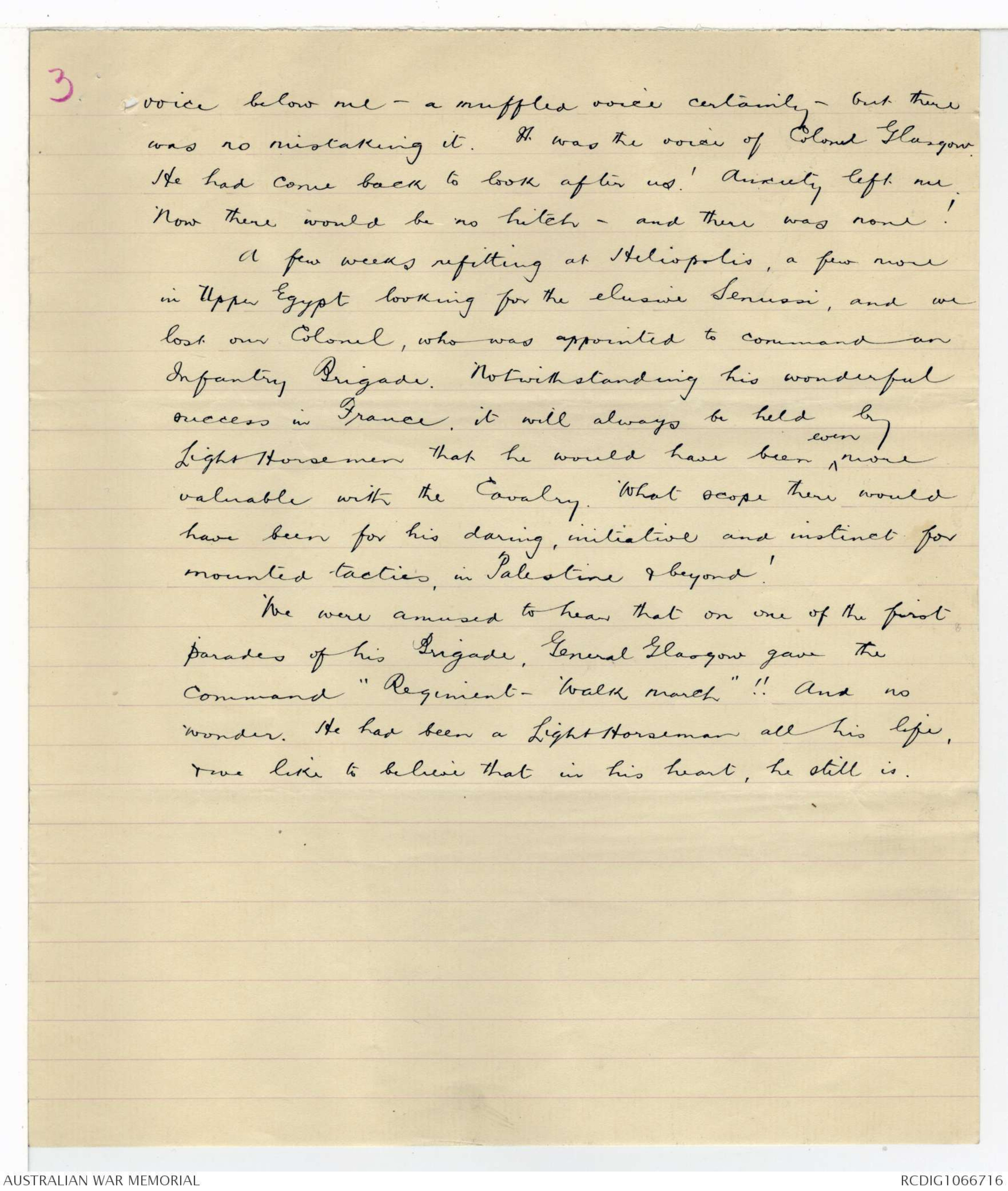
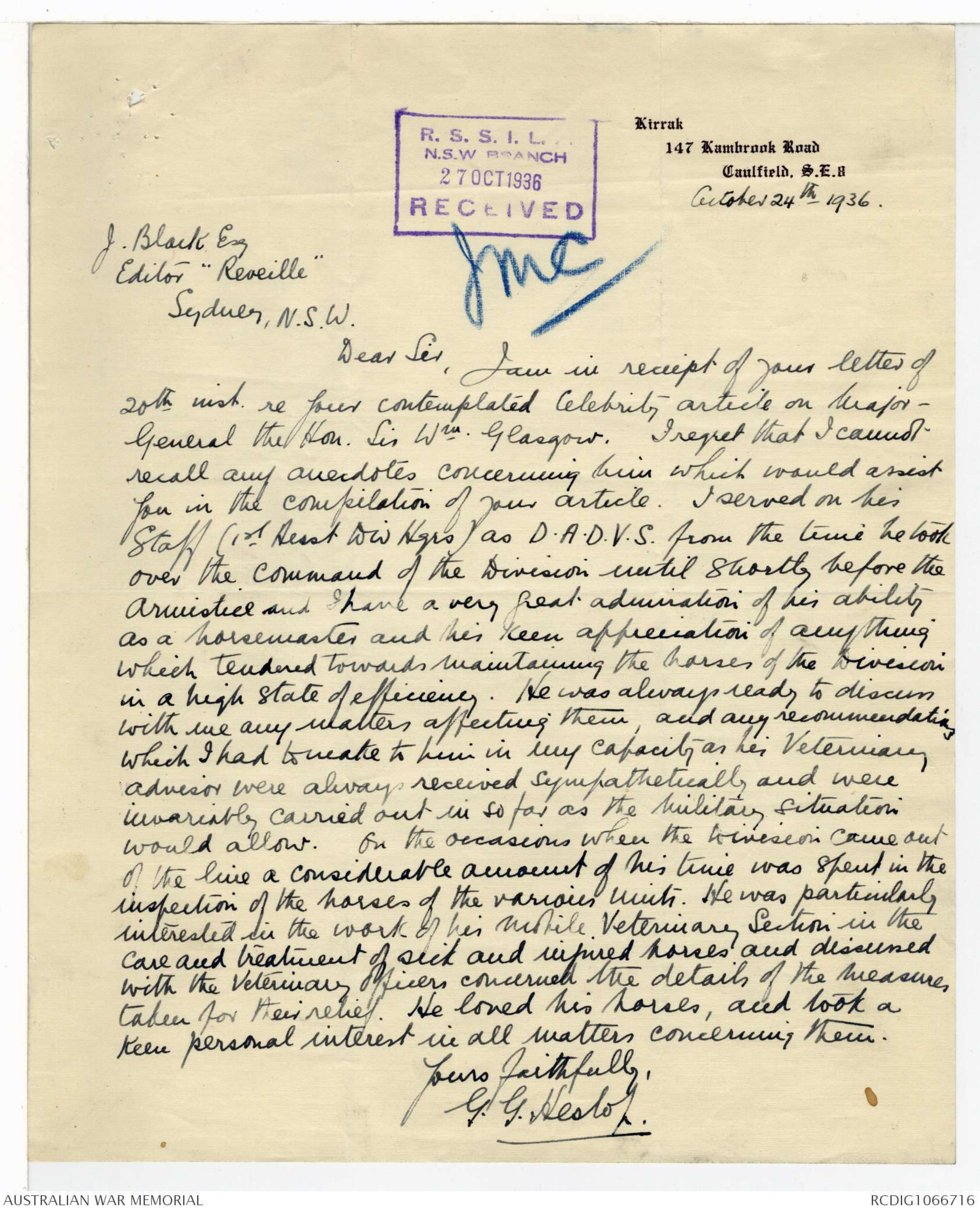
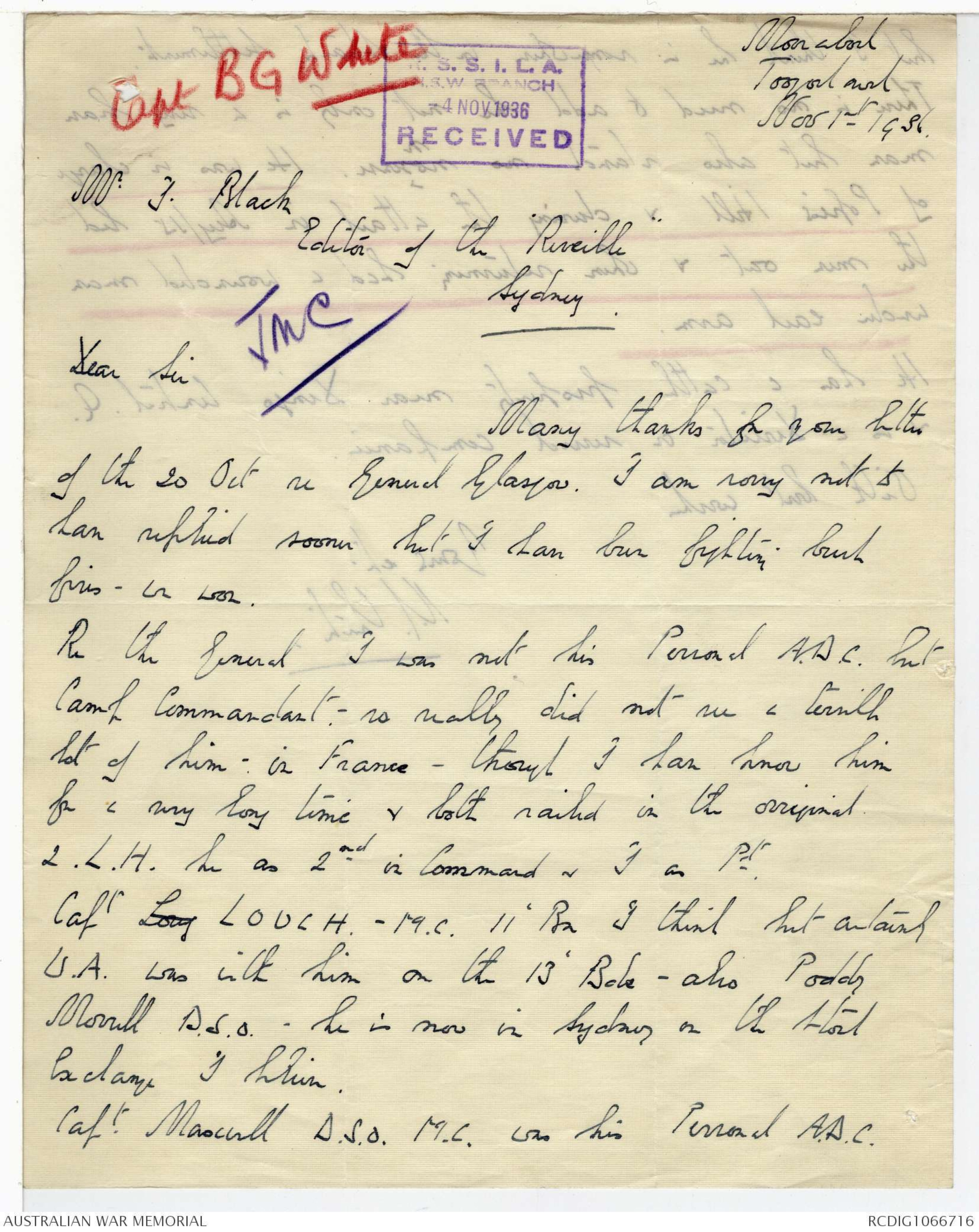
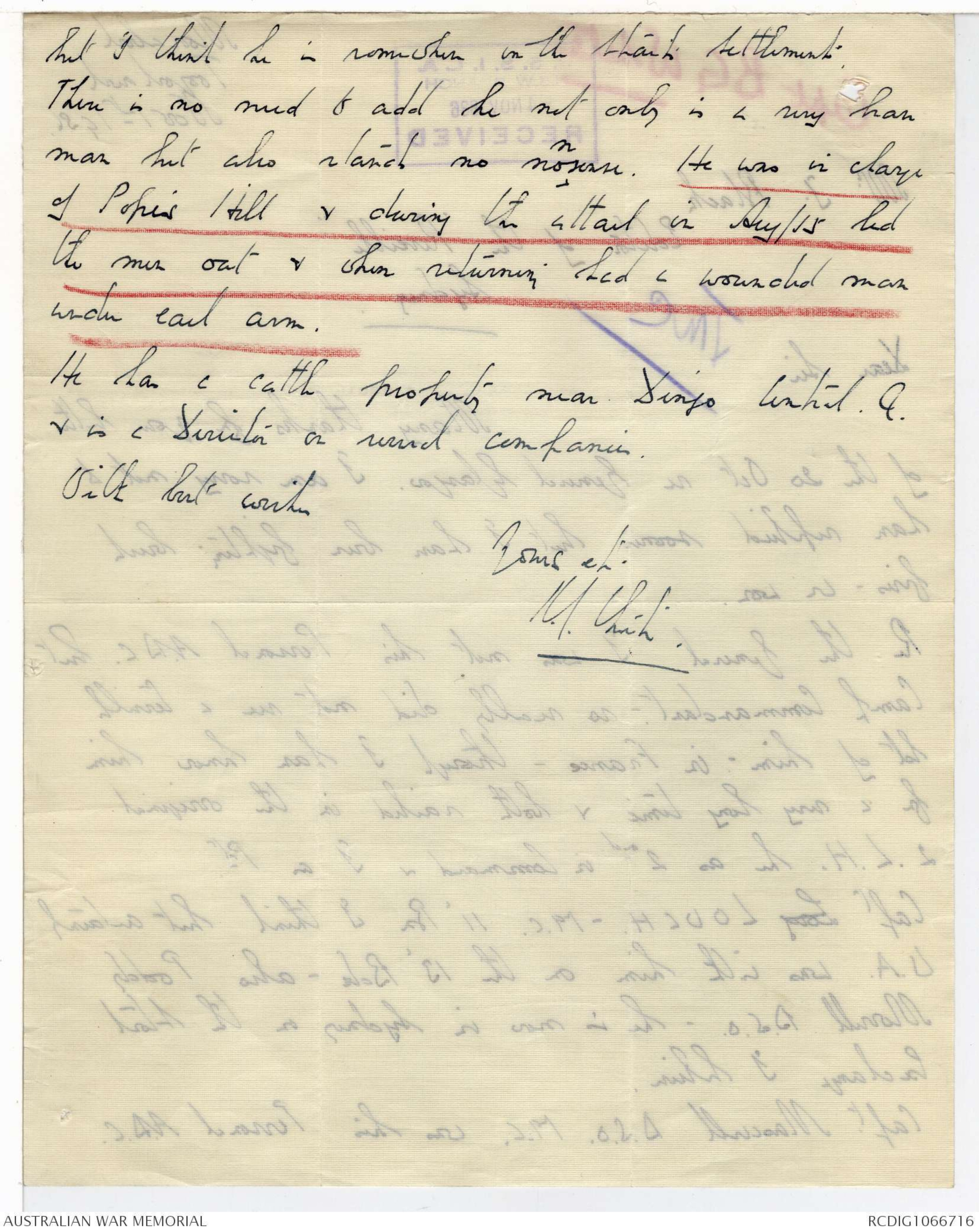
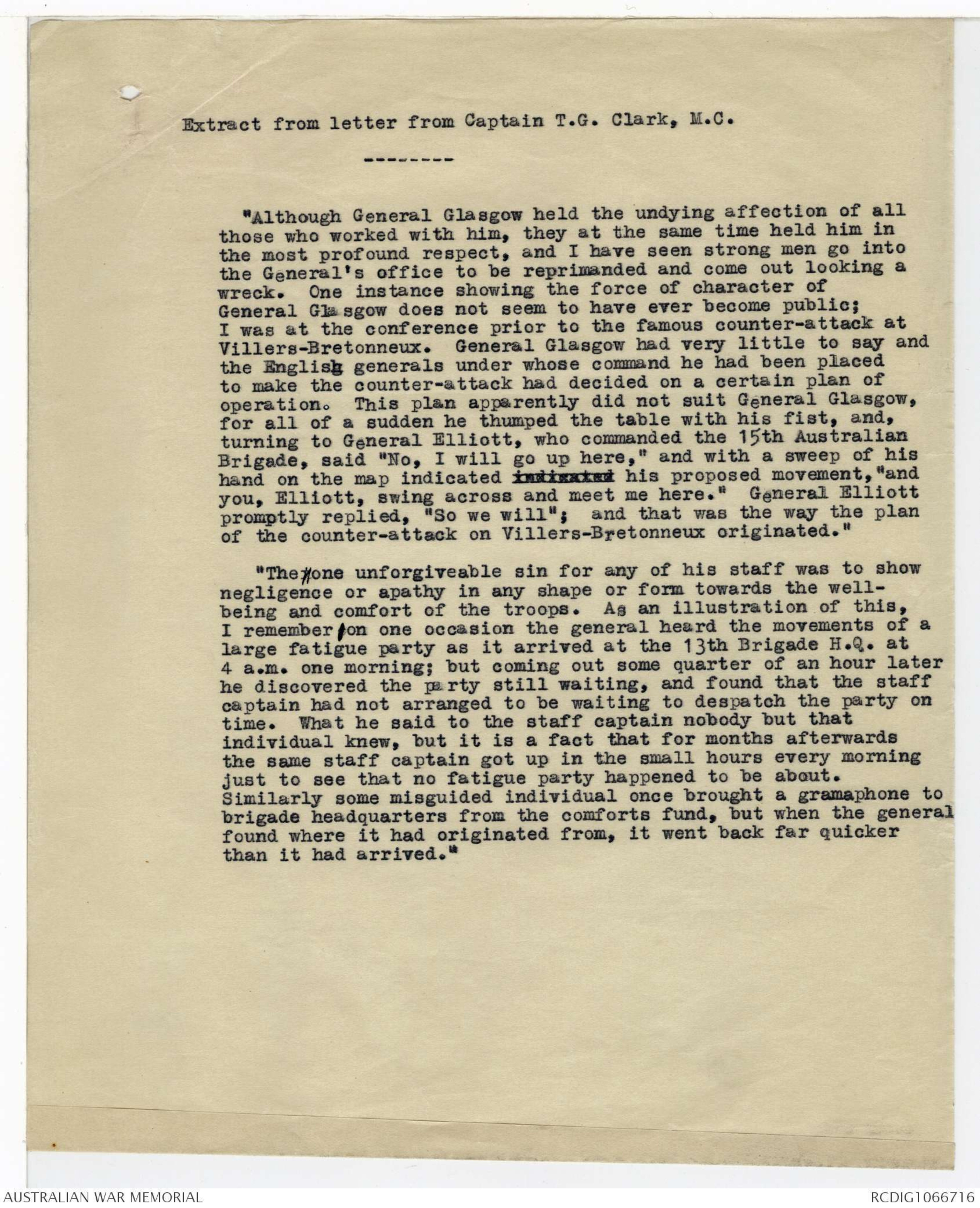
2.
consequently his advice was sound and, at times,
invaluable.
Quite rightly he refused to be jostled or "rushed",
and his firm & determined opposition to being
so, was especially exemplified in the brilliantly
successful counter attack at Villers Brettonneau
in April 1918 chiefly carried out by his -13th-
Infy Bde and an Inf Bde of 5th Aust Div, supported by
some troops of 8th Division (British) -. Here Glasgow
refused to attack until he & his Staff had been
able to reconnoitre the position & lay down jumping
off lines tapes, and his men had had a modicum
of rest after their march that day. The result
was a brilliant success & had far reaching results
on the rather precarious position - at that time -
in front of Amiens _
I know that our Army Commander, Sir Henry
Rawlinson & his M.G.G.S. were much impressed
with the conduct of the action, and with the
gallantry & leadership of the two Australian Brigades
concerned.
I feel my tribute to my old friend Gen' Glasgow
would not be adequate without reference to
his unremitting care & vigilance as regards the
3.
comfort & wellbeing of the personnel under his
command & he never spared himself in his efforts
to get the best he could for them; realizing, as
many Australian Commanders did, that the
"Digger" would nobly respond to carry out,
successfully, the most difficult tasks, if he
knew - or felt - that his commanders were doing
their best to look after him & supply his needs.
___________ . . __________
[* [[?? noted CC?]] *]
I would take this opportunity of again
thanking you for your excellent Periodical
and with all my old friends & comrades of A.I.F.
the best of good wishes for Xmas 1936 and
for 1937.
Yours sincerely
E.G. Sinclair MacLagan
Maj. Gen.
late 3rd A.I.Bde & 4th Aust Div A.I.F.
[* Lt Col GH Bourne
2 Lit Regt *]
JMC
R.S.S.I.L.A.
NSW BRANCH
-4 NOV 1936
RECEIVED
Bank of New South Wales
Christchurch
28th. Oct 1936
The Editor
"Reville"
Dear Sir,
As requested in your letter of 19th inst
I enclose a few notes re Major General Sir Wm
Glasgow & only wish I had more of them with
which to do honour to this splendid soldier.
If you have not already done so, I suggest
that you ask "Sol" Green, the original Padre of the
2nd L.H.Regt, to help. He followed Glasgow to France
& was in close touch with him there. He kept a
book of anecdotes & no doubt would have many
good ones of our mutual friend.
His address I believe is :- Rev George Green M.A.
St. Kilda, Melbourne.
Hoping to have the pleasure of reading your article
when published
Yours faithfully
Geo H. Bourne
1
When on the outbreak of War, the 2nd Light Horse Regt
was formed, Major J.W. Glasgow was one of the first
officers to be appointed. As Second-in-Command to
Lt. Col R.M. Stodart, he took a very active part in
training the Regiment - his great energy and zeal
being an inspiration to the younger officers. In those
early days, what chiefly impressed us were his strict
discipline, justice, forceful personality and knowledge
of his job. During the voyage to Alexandria, and
training at Maadi and Heliopolis, these Characteristics
were largely responsible for the high state of
efficiency which the Regiment reached.
Immediately prior to the receipt of orders to embark
for Gallipoli, he was straining at the leash - the most
impatient man at Heliopolis
Gallipoli gave him his chance, and as was only to be
expected, he grasped it eagerly. He was appointed
"Officer in Charge" of Pope's Hill, in succession to the late
Lt.Col Rowell (3rd L H Regt.) and at the head of the
1st L.H. Regt gallantly led the sortie on 7th August,
capturing several trenches of the famous "Chessboard"
That they had to be evacuated later was not his
fault
A few days later he was appointed to command
his old Regiment, then, sadly depleted in numbers after
its sortie from Quinns Post, in reserve at old No 2 outpost
& Fishermans Hut
2
During this period there was little that Colonel Glasgow
could do, apart from keeping up the spirits of the men
and doing what was possible to conserve their health
& strength. We were all as poor as wood, and apart
from his shaggy eyebrows, iron jaw, and voice, there did
not appear to be much of him left.
When orders for the evacuation were received, Colonel
Glasgow with a few of the original members of the Regt.
were enjoying a brief respite at Lemnos. He applied
at once for permission to return to Gallipoli, in order
to supervise the withdrawal of the balance of his Regt..
On this being refused, he took "French leave" & simply
went!
Who, among those of us who were there, will ever forget the
strain of those last few hours of the evacuation? We
were weak - most of us were ill. The strain on the nerves
was increased by the silence & the whispered orders.
Picture a Signaller, with his head piece over his ears,
under orders to come away with the last party. "All clear?
"Yes -all clear - Any news? No" Would all proceed
according to plan? Was it possible that there could
be no hitch, no misunderstanding? Would the minutes
never pass? How many of us would miss the last
boats & have to make a last stand with the Rear party?
Is this one of our parties coming down the trench? or is Jacko already following up?
Such, I confess, were my thoughts. The suspense
was becoming unbearable! Suddenly I heard a
3
voice below me - a muffled voice certainly - but there
was no mistaking it. It was the voice of Colonel Glasgow.
He had come back to look after us! Anxiety left me.
Now there would be no hitch - and there was none!
A few weeks refitting at Heliopolis, a few more
in Upper Egypt looking for the elusive Senussi, and we
lost our Colonel, who was appointed to command an
Infantry Brigade. Notwithstanding his wonderful
success in France, it will always be held by
Light Horsemen that he would have been even more
valuable with the Cavalry. What scope there would
have been for his daring, initiative and instinct for
mounted tactics, in Palestine & beyond!
We were amused to hear that on one of the first
parades of his Brigade - "Walk march" !! And no
wonder. He had been a Light Horseman all his life,
& we like to believe that in his heart, he still is.
R.S.S.I.L
N.S.W. BRANCH
27 OCT 1936
RECEIVED
JMC
Kirrak
147 Kambrook Road
Caulfield, S.E.8
October 24th 1936.
J.Black Esq
Editor "Reveille"
Sydney, N.S.W.
Dear Sir,
I am in receipt of your letter of
20th inst. re four contemplated celebrity article on Major-
General the Hon. Sir Wm. Glasgow. I regret that I cannot
recall any anecdotes concerning him which would assist
you in the compilation of your article. I served on his
Staff (1st Aust Div Hgrs) as D.A.D.V.S. from the time he took
over the command of the Division until shortly before the
Armistice and I have a very great admiration of his ability
as a horsemaster and his keen appreciation of anything
which tendered towards maintaining the horses of the Division
in a high state of efficiency. he was always ready to discuss
with me any matters affecting them, and any recommendations
which I had to make to him in my capacity as his Veterinary
advisor were always received sympathetically and were
invariably carried out in so far as the military situation
would allow. On the occasions when the Division came out
of the line a considerable amount of his time was spent in the
inspection of the horses of the various units. He was particularly
interested in the work of his mobile Veterinary Section in the
care and treatment of sick and injured horses and discussed
with the Veterinary officers concerned the details of the measures
taken for their relief. He loved his horses, and took a
keen personal interest in all matters concerning them.
Yours Faithfully,
G.G.Heslop.
R.S.S.I.L.A.
N.S.W. BRANCH
-4 NOV 1936
RECEIVED
Capt BG White
JMC
[[?Mooraborl?]]
[[? Tooporlawl?]]
Nov 1st 1936.
Mr J. Black
Editor of the "Reveille"
Sydney.
Dear Sir,
Many thanks for your letter
of the 20 Oct re General Glasgow. I am sorry not to
have replied sooner but I have been fighting bus
fires - we won.
Re the General I was not his Personal A.D.C. but
Camp Commandant. - so really did not see a terrible
lot of him - in France - though I have known him
for a very long time & both sailed in the original
2. L.H. he as 2nd in Command & I as Pt.
Capt Loug LOUCH. - M.C. 11' Bn I think but certainly
U.A. was with him on the 13' Bde - also Paddy
Morrill D.S.O. - he is now in Sydney on the Stock
Exchange I believe.
Capt Maxwell D.S.O. M.C. was his Personal A.D.C.
but I think he is somewhere in the Straits' Settlement.
There is no need to add he not only is a very [[?hon]]
man but who stands no nonsense. He was in charge
of Pope's Hill & during the attack in Aug/15 had
the men out & when returning had a wounded man
under each arm.
He has a cattle property near Dingo Central Q.
& is a Director on several companies.
With best wishes
Yours etc.
M. [[?Smith.]]
Extract from letter from Captain T.G. Clark, M.C.
------------
"Although General Glasgow held the undying affection of all
those who worked with him, they at the same time held him in
the most profound respect, and I have seen strong men go into
the General's office to be reprimanded and come out looking a
wreck. One instance showing the force of character of
General Glasgow does not seem to have ever become public;
I was at the conference prior to the famous counter-attack at
Villers-Bretonneux. General Glasgow had very little to say and
the English generals under whose command he had been placed
to make the counter-attack had decided on a certain plan of
operation. This plan apparently did not suit General Glasgow,
for all of a sudden he thumped the table with his fist, and,
turning to General Elliott, who commanded the 15th Australian
Brigade, said "No, I will go up here," and with a sweep of his
hand on the map indicated indicated his proposed movement, "and
you, Elliott, swing across and meet me here." General Elliott
promptly replied, "So we will"; and that was the way the plan
of the counter-attack on Villers-Bretonneux originated."
"The xone unforgivable sin for any of his staff was to show
negligence or apathy in any shape of form towards the well-being
and comfort of the troops. As an illustration of this,
I remember son one occasion the general heard the movements of a
large fatigue party as it arrived at the 13th Brigade H.Q. at
4 a.m. one morning; but coming out some quarter of an hour later
he discovered the party still waiting, and found that the staff
captain had not arranged to be waiting to despatch the party on
time. What he said to the staff captain nobody but that
individual knew, but it is a fact that for months afterwards
the same staff captain got up in the same hours every morning
just to see that no fatigue party happened to be about.
Similarly some misguided individual once brought a gramaphone to
brigade headquarters from the comforts fund, but when the general
found where it had originated from, it went back far quicker
than it had arrived."
 Sam scott
Sam scottThis transcription item is now locked to you for editing. To release the lock either Save your changes or Cancel.
This lock will be automatically released after 60 minutes of inactivity.